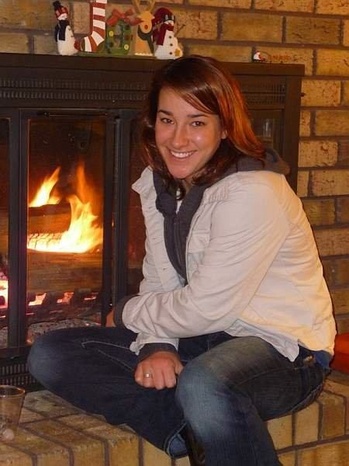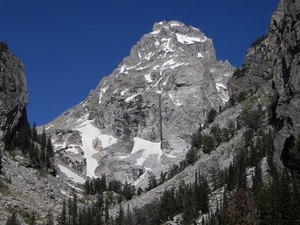University of Michigan considers changes in summer program following student's death in hiking accident
Following a hiking accident that claimed the life of a University of Michigan student, officials are now advising other students attending classes at the university's Camp Davis Rocky Mountain Field Station to stay on well-established trails only.
“There will be less going off on your own, at least for now,” said Terrence McDonald, dean of the U-M College of Literature, Science and the Arts.

Jillian Drow, 21, died July 20 following a hiking accident in Grand Teton National Park in Wyoming. The University of Michigan student and Chelsea resident had been taking a summer geology course in the area.
Photo courtesy of the Drow family
The death of U-M student and Chelsea native Jillian Drow in Wyoming's Grand Teton National Park was officially ruled an accident, park officials said Monday.
The 21-year-old environmental science junior fell 80 feet to her death on July 20 while hiking on her day off in the national park in Jackson Hole, Wyo. She was taking geology classes nearby at the Camp Davis Rocky Mountain Field Station.
Drow was descending the 12,804-foot Middle Teton when she separated from her climbing partner and fell 80 feet to her death. Park rangers placed the time of the accident between 4:30 p.m. and 6 p.m.
“Her hiking partner lost track of her about that time when he stopped to take a breather and she continued ahead of him,” Scaggs said.
She and her partner had summited the Middle Teton and were descending in an area of the mountain that didn't require special climbing equipment when the accident occurred.
Rangers believe Drow cut to the left during her descent, toward an exposed cliff area, while her partner later took a hard right toward a slope, assuming Drow was ahead of him. Drow’s decision turned out to be a fatal one; no one will ever know exactly what happened, Scaggs said.
Drow is the second U-M student to die in the mountains while hiking on a free day in the field station’s 81-year history; the last student died in 1983.
McDonald said students have always been given a strong and careful orientation to the hazards of the area.
“At the same time, we’re going to be looking at the accident again and see what we can learn about it in terms of policies and any potential changes we might make,” he said.

The Middle Teton in Grand Teton National Park.
Photo courtesy of Grand Teton National Park
U-M brought grief counselors for the other students immediately after the accident, McDonald said. The five-week session ended one day early following Drow’s death, and U-M flew all the students home.
Courses at Camp Davis only run in the summer. About 15 to 20 students went there for the next summer session in the days after Drow died. The department of geological sciences, which runs the field station, gave those students the option to cancel but all chose to attend, McDonald said.
Scaggs said that while deaths vary per year in the 310,000-acre park, between zero and six deaths have occurred annually in recent years. The causes of the deaths vary and include drowning, climbing and other accidents, as well as medical conditions.
The park had 3.8 million visitors last year, many of them drawn to scenic views and its 12 mountains that top 12,000 feet each. It is a well-known climbing and hiking destination worldwide, Scaggs said.
McDonald said changes for next year’s sessions remain to be seen.
“We have nine months to think and plan for the next season at the camps,” he said.
Juliana Keeping is a higher education reporter for AnnArbor.com. Reach her at julianakeeping@annarbor.com or 734-623-2528. Follow Juliana Keeping on Twitter


Comments
kmgeb2000
Tue, Aug 3, 2010 : 11:57 a.m.
First, my sincere condolences to the family. Being a geologist myself and having traversed Garnet Canyon in Tetons NP, going "off trail" is kind of the point of geology as outcrops don't follow predefined trails. The dean's comment There will be less going off on your own, at least for now ultimately cannot be followed to the letter (not by a geologist anyway). That is not to say use reckless abandon, but examining and mapping the geology means you go were the outcrops are accessible. The article indicates this was not class exercise, but try to stop a geologist from going where the rocks are - its' not going to happen. As KJMClark points out, basic back-country rules/guidelines need to be followed. Geology Field Camp for those in my class involved hazards including but not limited to extreme heat, rattle snakes, scorpions, a mountain lion, and traversing steep areas. We only had two minor emergency room visits as I recall (a twisted ankle and a hand impaled on a cactus). This is all a part of being a field geologist.
KJMClark
Tue, Aug 3, 2010 : 10:59 a.m.
My family was in the backcountry in the Tetons about a week after this incident. We went backpacking in Yellowstone first, and heard about this death and the missing hiker in the Yellowstone backcountry while we were in the airport. We eventually hiked up the misnamed "Death Canyon" in the Tetons the day we left Wyoming. It was beautiful, but very rocky. You could see sheer cliff walls rising on both sides of the canyon. Really, UM just needs to reinforce the basic backcountry rules. Travel with a partner, and don't leave your partner. Stay on established trails. Descents are more dangerous than climbs, so take extra care when descending. If those rules had been followed that day, it sounds like this tragedy wouldn't have happened.
Davidian
Tue, Aug 3, 2010 : 10:55 a.m.
@Feat of clay, to clarify: By "no principles" I was alluding to what you stated--too afraid to stand up against the possibility of a lawsuit, when the real issue is personal responsibility. I fail to see how short-sighted is hyperbole.
Feat of Clay
Tue, Aug 3, 2010 : 10:37 a.m.
"no principles" or are "unintelligent?" Pretty hyperbolic assessment of the decision-making, if you ask me. I think Ignatz' perspective is right; decisions like this are driven by concern about litigation, as the legitimate grief experienced by the student's peers and professors. It can seem desirable to try to "prevent" future grief, even though, as other commenters have stated, risk exists everywhere and you can't eliminate every tragedy that might befall students.
bunnyabbot
Tue, Aug 3, 2010 : 9:52 a.m.
as someone that has hiked in the Tetons it is common sense to stick to the trails. However their is always someone more expierienced and or aventurous who leave the trail and when they do so they do so at thier own risk. It was a tragic accident. Period.
Ignatz
Tue, Aug 3, 2010 : 9:01 a.m.
U-M is the biggest nanny on the block and will try to impose it's safety agenda upon all over whom they have even a modicum of control. However, much of this role has been adopted at the behest of parents who want their offspring to have a completely safe experience while on campus. Students and staff, too, expect the U to provide them with such an environment. It seems a human trait to want to make someone else responsible for their actions. Sometimes an accident is just an accident, but try to tell that to some juries.
Davidian
Tue, Aug 3, 2010 : 8:52 a.m.
This is a sad story, but U-M is not reacting appropriately. Are they going to change their policy to keep students from driving, flying, or riding bicycles? What about staying out after dark? What about sex? Even watching TV in excess can potentially kill someone. This is risk involved with daily life--life is inherently dangerous. I thought universities were supposed to educate people, not turn them into mindless automatons that can't make decisions for themselves. Either these administrators have no principles, or they really are that short-sighted and unintelligent.
em
Tue, Aug 3, 2010 : 8:47 a.m.
Given Jillian's beautiful adventurous spirit... I thiink she would be very sad about this decision.
5c0++ H4d13y
Tue, Aug 3, 2010 : 6:34 a.m.
Certainly a tragic death but this woman was 21 years old. Well past the age to maker her own decisions. How much should the university dictate the actions of adults attending these camps?